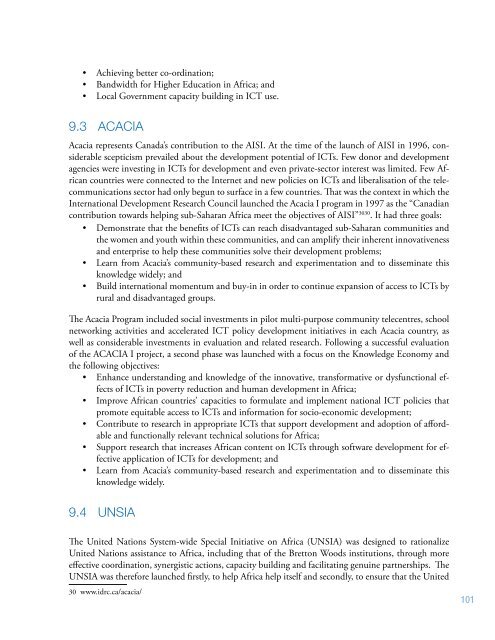The African Information Society Initiative (AISI) - United Nations ...
The African Information Society Initiative (AISI) - United Nations ...
The African Information Society Initiative (AISI) - United Nations ...
You also want an ePaper? Increase the reach of your titles
YUMPU automatically turns print PDFs into web optimized ePapers that Google loves.
• Achieving better co-ordination;<br />
• Bandwidth for Higher Education in Africa; and<br />
• Local Government capacity building in ICT use.<br />
9.3 ACACIA<br />
Acacia represents Canada’s contribution to the <strong>AISI</strong>. At the time of the launch of <strong>AISI</strong> in 1996, considerable<br />
scepticism prevailed about the development potential of ICTs. Few donor and development<br />
agencies were investing in ICTs for development and even private-sector interest was limited. Few <strong>African</strong><br />
countries were connected to the Internet and new policies on ICTs and liberalisation of the telecommunications<br />
sector had only begun to surface in a few countries. That was the context in which the<br />
International Development Research Council launched the Acacia I program in 1997 as the “Canadian<br />
contribution towards helping sub-Saharan Africa meet the objectives of <strong>AISI</strong>” 3030 . It had three goals:<br />
• Demonstrate that the benefits of ICTs can reach disadvantaged sub-Saharan communities and<br />
the women and youth within these communities, and can amplify their inherent innovativeness<br />
and enterprise to help these communities solve their development problems;<br />
• Learn from Acacia’s community-based research and experimentation and to disseminate this<br />
knowledge widely; and<br />
• Build international momentum and buy-in in order to continue expansion of access to ICTs by<br />
rural and disadvantaged groups.<br />
<strong>The</strong> Acacia Program included social investments in pilot multi-purpose community telecentres, school<br />
networking activities and accelerated ICT policy development initiatives in each Acacia country, as<br />
well as considerable investments in evaluation and related research. Following a successful evaluation<br />
of the ACACIA I project, a second phase was launched with a focus on the Knowledge Economy and<br />
the following objectives:<br />
• Enhance understanding and knowledge of the innovative, transformative or dysfunctional effects<br />
of ICTs in poverty reduction and human development in Africa;<br />
• Improve <strong>African</strong> countries’ capacities to formulate and implement national ICT policies that<br />
promote equitable access to ICTs and information for socio-economic development;<br />
• Contribute to research in appropriate ICTs that support development and adoption of affordable<br />
and functionally relevant technical solutions for Africa;<br />
• Support research that increases <strong>African</strong> content on ICTs through software development for effective<br />
application of ICTs for development; and<br />
• Learn from Acacia’s community-based research and experimentation and to disseminate this<br />
knowledge widely.<br />
9.4 UNSIA<br />
<strong>The</strong> <strong>United</strong> <strong>Nations</strong> System-wide Special <strong>Initiative</strong> on Africa (UNSIA) was designed to rationalize<br />
<strong>United</strong> <strong>Nations</strong> assistance to Africa, including that of the Bretton Woods institutions, through more<br />
effective coordination, synergistic actions, capacity building and facilitating genuine partnerships. <strong>The</strong><br />
UNSIA was therefore launched firstly, to help Africa help itself and secondly, to ensure that the <strong>United</strong><br />
30 www.idrc.ca/acacia/<br />
101

















